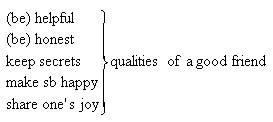課程內容
Unit 1《Friends》(1)
A friend in need is a friend indeed!
患難之中見真情!
It's better to give than to receive.
給予總比接受好。
A friend is never known till a man has need.
需要之時方知友。
Main Tasks
·Comic Strip
·Welcome to the unit
·Language Points
Let's meet Eddie and Hobo and describe them!
Eddie: fat, lazy, funny, interesting
Hobo: clever, lovely, friendly ...
What will happen to Eddie and Hobo now?
Read their dialogue
Picture 1:
Hobo: I'm hungry, Eddie.
Eddie: I have a cake. Do you want some?
Picture 2:
Hobo: You're so kind, Eddie. Can I have something to drink, please?
Eddie: What about some milk?
Picture 3:
Hobo: Yes, please. Can I have some more food too?
Eddie: Sorry, Hobo. There's nothing else in the fridge.
Picture 4:
Hobo: What about the pizza in your bowl? Maybe we can share it.
Review their dialogue
And answer the questions.
1. What does Eddie give Hobo?
2. Is there anything else in the fridge?
3. Why does Hobo want Eddie's pizza?
4. What does Hobo think of Eddie?
5. Why does Eddie give his food to Hobo?
6. Who do you like more/better, Eddie or Hobo? Why?
What do you think of Eddie?
I think that Eddie is ...
helpful: help his friend when ...
friendly: share his food with ...
generous: give his food to ...
(not stingy 吝嗇)
Now role-play the conversation!
What makes your friends so special?

Now match the qualities with the questions in A on P7.
A: Daniel is reading on advertisement in 'Teenagers' magazine. He is matching the qualities on the left with the questions on the right. Help him write the correct letters in the boxes.
1. helpfull a. Do you talk to him/her when you are sad?
2. honest b. Do you talk to him/her when you are happy?
3. keep secrets c. Can you talk to him/her about anything?
4. make me happy d. Do you talk to him/her when you have problems?
5. share my joy e. Do you believe what he/she says?
Make a similar dialogue:
A: When you have problems, who do you talk to?
B: My good friend.
A: Why?
B: Because he/she is helpful.
(1) be sad -- make me happy
(2) be happy -- share my joys
What qualities are important in a good friend?
What other qualities should good friends have?
clean and tidy
clever
friendly
funny
good-looking
helpful
musical
generous
polite
Different people have different ideas.
Make sentences like these:
1. I think that to be + adj. is (very important).
2. I don't think that to be + adj. is (very important).
3. My partner thinks that to be + adj. is (not very important).
4. It is (quite important) for my best friend to be + adj.
Language points:
1. You are so kind. 你真好。
kind adj. 善良的
= It's so kind of you.
be kind/polite/nice/good/helpful ... to sb.
We should be kind to all kinds of animals.
我們應該善待各種動物。
2. Can I have something to drink, please?
請問我能喝點什么嗎?
Can I...?是表示請求或征求意見的一種句型。我們還可以用Could I...?句型表示請求或征求意見,用could比用can語氣更為委婉。但要注意:對Could I...?之類的句型的回答時不用Yes, ...could. 而要用Yes, ... can.或Certainly/Of course/Sure等。
--Can I have a pizza?
--Of course.
--Could I play basketball now?
--Yes, you can.
something用于疑問句中,表示建議、請求等特珠語,希望得到對方的肯定回答。
--Would you like something to eat?
--Yes, thanks a lot.
something to drink/eat/read 喝的/吃的/讀的東西
to drink是動詞不定式作后置定語,修飾不定代詞
something,anything,nothing,everything等不定代詞被形容詞、動詞不定式修飾時,形容詞或動詞不定式要后置。
something interesing 有趣的事情
There is nothing important in today's newspaper.
今天的報紙上沒有什么重要的事情。
He had nothing to say. 他無話可說。
I have something to tell you. 我有一些事情要告訴你。
當形容詞和不定代詞同時修飾不定代詞something等時,其順序為“不定代詞+形容詞+不定式”
something delicious to eat 一些好吃的東西
anything interesting to read 任何有趣的讀物
everything important to do 一切要做的重要的事
nothing else to eat 沒有什么別的可吃的東西
3. Can I have some more food too?
我還能再要點食物嗎?
some一般用于肯定句,any一般用于否定句或疑問句。但在一征求對方意見或表達自己意愿的句子里常用some,而不是any。
some more food 另外一些食物,more表示“再,又”
Would you like some more cake? 你想再要一點蛋糕嗎?
數詞+more+名詞=another+數詞+名詞
I want to buy another two books.
=I want to buy two more books.
She wants to stay here for another 3 weeks.
=She wants to stay here for 3 more weeks.
4. There's nothing else in the fridge.
冰箱里沒有其他的東西了。
else adj. & adv. “別的;其他的;另外;其他;還”
(1)else用在something,anything,somebody,nobody,everybody等不定代詞之后。
Do you want someone else to help you?
你想讓別人來幫助你嗎?
I don't have anything else to do. 我沒有其他的事情可做了。
(2)else用在what,who等疑問代詞之后(但不能用于which之后)。
What else would you like? 你還想要點別的什么東西嗎?
Who else wants to see the film? 還有誰想看那部電影?
(3)else用在when,where,why,how等疑問副詞之后。
Where else did you go? 你還去了哪里?
一定要將else放在所修飾的詞后
辨析:else與other
················
詞條 位置 修飾對象 例句
else 位于所修飾詞之后 不定代詞如something、疑問代詞如who或疑問副詞如when What else do you want?你還想要別的什么東西?
other 位于所修飾詞之前 名詞 What other things do you want?你還想要別的什么東西?
nothing=not anything
我的手表沒有壞。
There is nothing wrong with my watch.
=There isn't anything wrong with my watch.
Nothing in the world is difficult if you put your heart into it.
世上無難事,只怕有心人。
辨析Maybe與may be
Maybe 副詞,作狀語,“很可能,大概”=perhaps放在句首。
may be 情態動詞+動詞原形,作謂語“可能是”。
Maybe you are right. 或許你是對的。
You may be right. 你或許是對的。
... is inviting teenagers to join a writing competition.
(1) invite sb to do sth
(2) invite sb to some place
e.g. I invite her to play basketball.
He invited me to his home.
share my joy
joy既可作可數名詞,也可作不可數名詞。用作可數名詞時,意為“使人高興的事;一種快樂的情緒”;用作不可數名詞時,意為“高興,愉快”。例如:
On a hot davy, having a cool swim is a joy.
在大熱天里,涼爽地游一場泳是一件令人高興的事。
★此外,joy常見的搭配有:for/with joy(高興地),to one's joy(使某人高興的是)。例如:
They jumped for joy/laughed with joy.
他們高興地跳了起來/高興地笑著。
To the boy's great joy, his mother buys a bike for him.
使這個男孩很高興的是他媽媽給他買了一輛自行車。
詞匯辨析
believe & believe in
(1)believe有“相信;信以為真”之意,通常用作及物動詞,其后可直接接賓語。
例如:
Do you believe his report?
你相信他的報告嗎?
I could hardly believe my eyes.
我幾乎不能相信自己的眼睛。
(2)believe in有“信仰;信任”之意,常與表示宗教、理論、原則、概念等的名詞或人連用,此時的believe是不及物動詞。
例如:
They need a leader they can believe in.
他們需要一個可以信賴的領導。
Some people believe in everlasting life after death.
有些人相信死后可以永生。
P6-7重點詞組
1、餓了 be hungry
2、一些喝的 something to drink
3、再要些食物 have some more food
4、沒有別的東西 nothing else
5、看一則廣告 read an advertisement
6、使你的朋友如此特別 make your friend so special
7、保密 keep a secret/keep secrets
8、使我高興 make me happy
9、分享我的快樂 share my joy
10、和他談任何事情 talk to him about anything
11、有問題 have problems
12、相信他的話 believe what he say/his words/the words he says
13、干凈整潔 clean and tidy
14、一個誠實的男孩 an honest boy
15、寫信給我們/收到我們的來信 write to us/hear from us
此內容正在抓緊時間編輯中,請耐心等待
邊老師
女,中教中級職稱
教育教學教研成績優異,教學理念先進、教學方法靈活。





